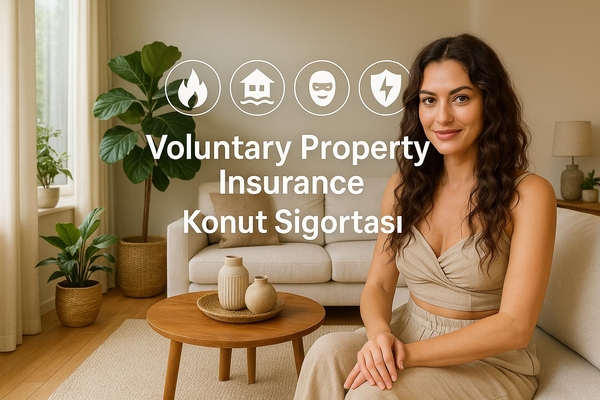Insurance for Property Owners in Turkey

Insurance for Property Owners in Turkey
Owning property in Turkey comes with countless advantages — from stunning sea views to attractive rental returns. However, like in any country, protecting your investment through property insurance is crucial. Whether you live in your apartment or rent it out, understanding DASK and voluntary insurance will help you safeguard your home from unexpected events.
1. What Is DASK (Compulsory Earthquake Insurance)?
DASK — short for Doğal Afet Sigortaları Kurumu — is mandatory earthquake insurance in Turkey. It was introduced after the 1999 Marmara earthquake to provide financial protection for homeowners in case of natural disasters.
Key features:
- Compulsory for all properties with a title deed (TAPU).
- Required for essential procedures such as utility connections (electricity, water, internet) and property sales.
- Covers structural damage caused by:
- Earthquakes,
- Fires following earthquakes,
- Explosions or landslides resulting from seismic activity.
Important: DASK covers only the building’s structure (walls, ceilings, foundations). It does not include furniture, electronics, or interior decoration.
2. What Does DASK Cover in Turkey?
The table below summarizes DASK coverage:
| Type of Damage | Covered by DASK | Not Covered |
|---|---|---|
| Structural damage (walls, floors, roofs) | ✅ | — |
| Furniture, appliances, personal belongings | ❌ | Yes |
| Rental income loss | ❌ | Yes |
| Gardens, pools, outbuildings | ❌ | Yes |
| Fires or floods not caused by an earthquake | ❌ | Yes |
The maximum compensation limit is determined annually by the government and depends on:
- Property location (seismic risk zone),
- Building type and size (m²),
- Construction year and material quality.
3. How to Get a DASK Policy in Turkey
Obtaining a DASK policy is simple and affordable. You can get it through:
- Any Turkish insurance company,
- Most banks,
- Or your real estate agency or property manager (for example, RestProperty).
You’ll need:
- TAPU (title deed),
- Turkish ID or passport number,
- Tax number,
- Full property address,
- Size of the property in square meters.
The policy is valid for 12 months and must be renewed annually.
4. Voluntary Property Insurance (Optional but Recommended)
While DASK is compulsory, it provides limited coverage. That’s why most foreign and local homeowners choose voluntary property insurance — known as Konut Sigortası.
Voluntary insurance covers:
- Furniture, electronics, and personal items
- Fire, flood, theft, or vandalism
- Water damage (pipe leaks, roof leaks)
- Natural disasters not covered by DASK (storms, lightning, hail)
- Third-party liability (damage to neighbours’ property)
- Temporary accommodation expenses during repairs
Tip: For investors, you can also add rental income protection, which compensates for lost rent if the property becomes uninhabitable.
5. Average Property Insurance Cost in Turkey
Insurance premiums in Turkey are among the most affordable in Europe.
| Insurance Type | Average Annual Cost (approx.) |
|---|---|
| DASK (mandatory) | €10–€25 per year |
| Voluntary home insurance | €100–€300 per year |
| Combined DASK + full coverage policy | €120–€350 per year |
Actual prices depend on property size, city, risk zone, and insurance company.
6. Why Property Insurance Is Essential for Foreign Owners
For foreign investors and homeowners, insurance provides more than peace of mind — it’s a legal and financial safeguard.
Benefits include:
- Protecting your capital investment
- Simplifying mortgage or resale procedures
- Meeting tenant safety standards (for rental properties)
- Ensuring compliance with Turkish regulations
If your apartment is managed by a licensed agency like RestProperty, they’ll monitor policy renewals, verify coverage, and handle claims on your behalf.
7. DASK vs. Voluntary Insurance — What’s the Difference?
| Feature | DASK (Mandatory) | Voluntary Insurance |
|---|---|---|
| Legal status | Required by law | Optional |
| Coverage | Earthquake-related structural damage only | Covers interior, theft, fire, flood, and liability |
| Duration | 1 year | 1 year (renewable) |
| Cost | Low (€10–€25/year) | Moderate (€100–€300/year) |
| Compensation | Limited | Full, depending on policy |
➡️ The best protection combines DASK + voluntary insurance, ensuring comprehensive coverage for both structure and contents.
8. How RestProperty Assists Property Owners
RestProperty, founded in 2003, is one of Turkey’s leading real estate and property management agencies, officially licensed by TÜRSAB (Association of Turkish Travel Agencies). The company offers full legal and administrative support to homeowners and investors.
For property owners:
- Assistance in obtaining or renewing DASK
- Help choosing the best voluntary insurance plan
- Coordination with insurers in case of claims
- Full rental and maintenance management
- Reporting and reminders for annual renewals
With RestProperty, your property is legally protected, insured, and managed professionally.
9. Common Mistakes to Avoid
Forgetting to renew DASK — utility companies may suspend service.
Assuming DASK covers interior or furniture — it doesn’t.
Choosing the cheapest voluntary policy without checking exclusions.
Not updating the policy after renovations or furnishing.
Always review coverage details carefully or consult your property management company before signing.
10. Key Takeaways
DASK is mandatory for all homeowners in Turkey — it covers earthquake-related structural damage.
Voluntary insurance provides extra protection for interiors, contents, and third-party liability.
The best solution is combining both policies for full protection.
Licensed agencies like RestProperty (TÜRSAB) help foreign owners manage insurance, taxes, and maintenance legally and efficiently.
Conclusion
Whether you own a holiday apartment or an investment property, insurance in Turkey is a small price to pay for peace of mind. Protect your home, your tenants, and your income with the right DASK and voluntary insurance coverage.
💼 RestProperty — protecting your property and peace of mind in Turkey since 2003.





